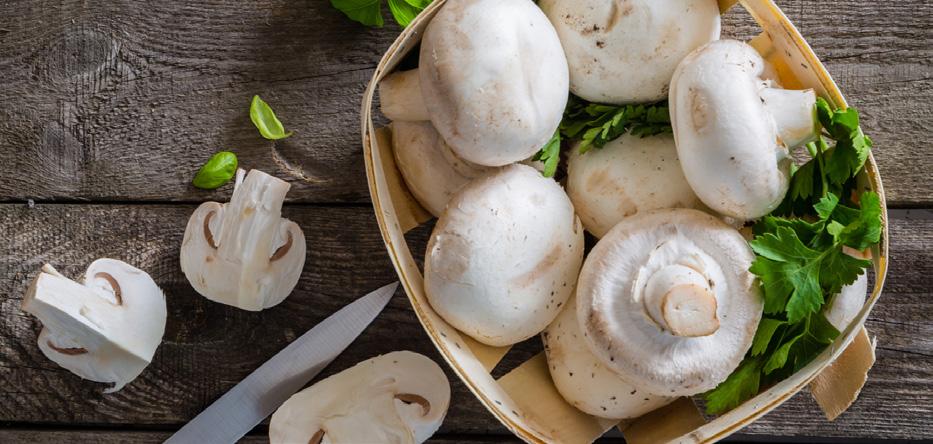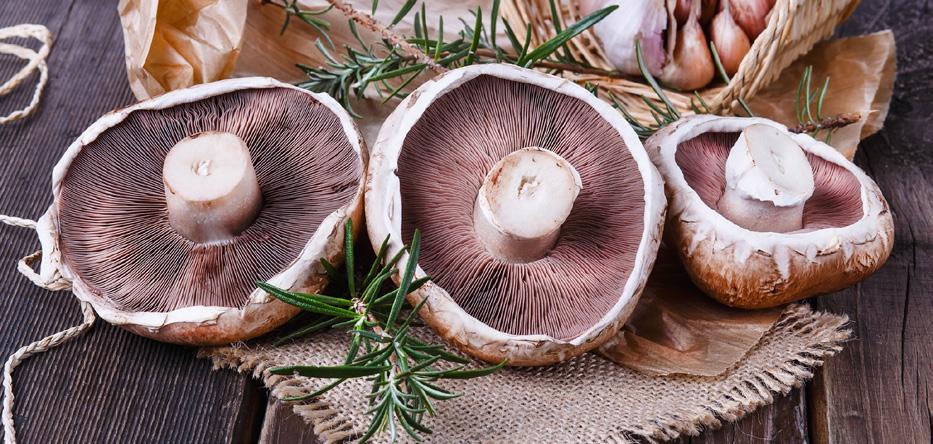
3 minute read
Miraculous Mushrooms Are a Food Powerhouse
from OR Today April 2023
By Grace O
M ost of the people I know have very strong feelings about mushrooms – they either love them or hate them. One of the beauties of mushrooms is that they usually take on the flavor of whatever they are cooked with. If it’s garlic and olive oil, that’s what they taste like. If they’re in a spicy Asian stir-fry, they take on those flavors. Rich in B vitamins such as riboflavin, folate, thiamine, pantothenic acid, and niacin, they are also the only vegan, non-fortified dietary source of vitamin D. Mushrooms also provide several minerals that may be difficult to obtain in the diet, such as selenium, potassium, copper, iron and phosphorus.
With just 45 calories per cup, you can afford to indulge in these versatile fungi. I prefer fresh mushrooms and use organic ones whenever I can find them.
Paul Stamets, the noted mycologist (mushroom and fungi expert), is passionate about mushrooms because he sees them as “improving the health of the population and the planet using natural means.” The premise of his very interesting book, “Mycelium Running: How Mushrooms Can Help Save the World” is that the soil contains vast networks of mycelium, the vegetative part of a fungus. It’s all pretty technical, but basically through the mycelium, a fungus absorbs nutrients from its environment in a two-stage process: First, by secreting enzymes onto a food source, such as a fallen tree or other dead plants, which breaks it down. Then, the resulting molecules and nutrients are absorbed into the mycelium and enrich the soil. As a defense against bacterial invasion, fungi have developed strong antibiotics, which also happen to be effective for us humans. Penicillin, streptomycin and tetracycline all come from fungal extracts. Mushrooms, which thrive on decaying organic material, are able to absorb nutrients and safely eliminate toxins. Here’s more on what mushrooms can do for us. They can:
• Improve Immune System Function – Mushrooms are rich in protein, fiber, vitamin C, B vitamins, calcium and minerals. There are about 50 species of medicinal mushrooms that are so rich in antioxidants they can do everything from boosting your immune function to lowering your risk of cancer, heart disease and allergies. The alpha and beta glucan molecules present in mushrooms play a major role in their beneficial effects.
• Increase Vitamin D Levels
– Consuming dried white button mushroom extract was found to be as effective as taking supplemental vitamin D2 or D3. Interestingly, Stamets’ book cites a study in which shiitake mushrooms increased in vitamin D from 110 IUs when they were dried indoors to 21,400 IUs when they were dried in the sunlight. D vitamins are essential for the body to absorb calcium and maintain bone health.
• Help with Weight Loss –Mushrooms increase enzymes with antioxidant activity. Studies show they can be metabolic enhancers, stimulating the breakdown of sugar in blood cells. Replacing a beef patty with a hearty Portobello mushroom eliminates over 100 calories.
Not all edible mushrooms are good to eat. Some such as turkey tail or maitake (hen of the woods) are highly beneficial, but only readily available as dietary supplements. Meanwhile, here are a number of delicious mushroom varieties that you can find fresh in the produce section of your local supermarket or online in dried form.
OUT OF THE OR nutrition
stage cancer patients. Reishis are natural stress reducers – helpful to those under physical and emotional stress. You can find them online in dried form and in supplement capsules.
Shiitake – One of the most widely cultivated and tastiest mushrooms, shiitakes contain a chemical called lentinan, approved as an injectable drug in Japan to help prevent damage from anti-cancer drugs. Shiitake mushrooms help increase the activity of T-cells which stimulates the immune system. The theory is that, because they are fungi, they trick the immune system into thinking it’s under attack. Japanese studies suggest that the consumption of shiitakes lowers blood cholesterol by 45% due to an ingredient called eritadenine.
Cremini – These are the common white button mushrooms found in most supermarkets. According to Regina Wilshire, N.D., a 5-ounce serving contains 50% of RDA for the cancer-fighting trace mineral selenium, 40% of RDA for riboflavin, 35% of copper, 30% of niacin, 20-25% of pantothenic acid, phosphorous, and zinc, plus 10-15% of manganese and thiamin.

Reishi – In traditional Chinese medicine, reishi mushrooms are considered to have many health and curative properties. The Sloan-Kettering Cancer Center website suggests that reishi extract stimulates the immune system. The site also states that there have been clinical studies indicating that it increases antioxidant capacity and enhances immune responses in advanced-
Portobello – These are the mature cremini mushrooms and are found in most supermarkets. They have a meaty texture and an intense, earthy flavor. They are low in calories and high in pantothenic acid, niacin, folate, thiamin and B vitamins, which are important for a healthy metabolism, skin, liver and hair health.
Whether you love eating mushrooms or prefer taking them as supplements, one thing is certain – they are healthy little powerhouses of immunity boosters, antioxidants, vitamins and minerals.


– Grace O is the creator of FoodTrients, a unique program for optimizing wellness and longevity. She is the author of three award-winning cookbooks. Her latest cookbook is “Anti-Aging Dishes from Around the World.” Learn more at FoodTrients.com.











